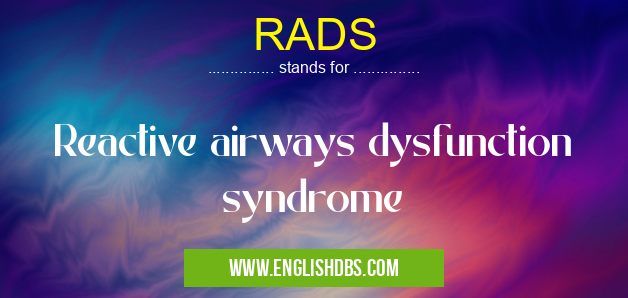What does RADS mean in BRITISH MEDICINE
Reactive airways dysfunction syndrome (RADS) is a condition that affects the airways, causing them to become inflamed and narrow. This can lead to difficulty breathing, wheezing, coughing, and chest tightness. RADS is often caused by exposure to an irritant, such as smoke, dust, or chemicals.

RADS meaning in British Medicine in Medical
RADS mostly used in an acronym British Medicine in Category Medical that means Reactive airways dysfunction syndrome
Shorthand: RADS,
Full Form: Reactive airways dysfunction syndrome
For more information of "Reactive airways dysfunction syndrome", see the section below.
Signs and symptoms
The signs and symptoms of RADS can vary from person to person. Some people may only experience mild symptoms, while others may have more severe symptoms that can interfere with their daily lives. Common symptoms of RADS include:
- Difficulty breathing
- Wheezing
- Coughing
- Chest tightness
- Shortness of breath
- Fatigue
- Headache
- Muscle aches
- Nausea
- Vomiting
Causes
RADS is often caused by exposure to an irritant. Common irritants include:
- Smoke
- Dust
- Chemicals
- Pollution
- Perfumes
- Cleaning products
- Strong odors
Diagnosis
RADS is diagnosed based on a patient's symptoms and a physical examination. Your doctor may also order a chest X-ray or a pulmonary function test to confirm the diagnosis.
Treatment
Treatment for RADS typically involves avoiding exposure to the irritant that is causing the symptoms. Your doctor may also prescribe medications to help reduce inflammation and open up the airways. These medications may include:
- Inhaled corticosteroids
- Bronchodilators
- Anti-inflammatory drugs
Prevention
The best way to prevent RADS is to avoid exposure to the irritants that can cause it. If you are exposed to an irritant, be sure to wash your hands thoroughly and rinse your face and eyes with water. You should also try to avoid spending time in areas where there is a lot of smoke or pollution.
Essential Questions and Answers on Reactive airways dysfunction syndrome in "MEDICAL»BRITMEDICAL"
What is RADS?
Reactive airways dysfunction syndrome (RADS) is a respiratory condition characterized by persistent wheezing, coughing, and difficulty breathing that develops after exposure to a triggering agent, such as an irritant or allergen.
What causes RADS?
RADS is typically triggered by exposure to certain substances or irritants, such as:
- Chemicals (e.g., chlorine, ammonia)
- Smoke (e.g., from wildfires, house fires)
- Dust (e.g., from construction sites, agricultural areas)
- Allergens (e.g., pollen, pet dander)
What are the symptoms of RADS?
Symptoms of RADS can include:
- Wheezing
- Coughing
- Shortness of breath
- Chest tightness
- Difficulty sleeping due to respiratory problems
How is RADS diagnosed?
RADS is diagnosed based on a patient's symptoms, a physical exam, and a review of their medical history. Lung function tests may be performed to assess airflow and rule out other respiratory conditions.
How is RADS treated?
Treatment for RADS typically involves:
- Avoiding the triggering substance
- Medications to reduce inflammation and bronchospasm (e.g., inhalers, oral steroids)
- Bronchodilators to help open the airways
- Oxygen therapy, if necessary
Can RADS be cured?
RADS is typically a chronic condition that cannot be cured. However, treatment can often help manage symptoms and improve quality of life.
What is the prognosis for RADS?
The prognosis for RADS varies depending on the severity of the condition and the patient's response to treatment. With proper management, many people with RADS can live active and fulfilling lives.
Final Words: RADS is a condition that can affect the airways, causing them to become inflamed and narrow. This can lead to difficulty breathing, wheezing, coughing, and chest tightness. RADS is often caused by exposure to an irritant, such as smoke, dust, or chemicals. Treatment for RADS typically involves avoiding exposure to the irritant and taking medications to reduce inflammation and open up the airways.
RADS also stands for: |
|
| All stands for RADS |
